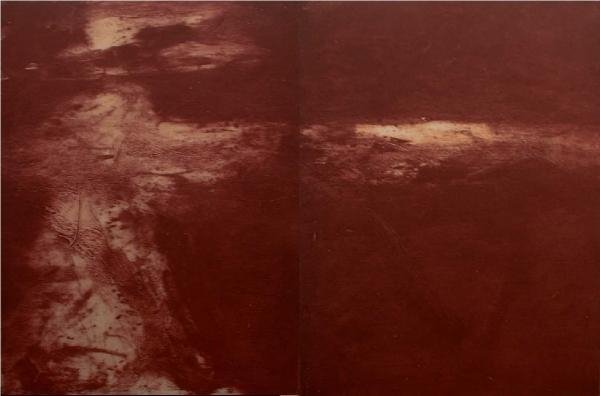Hughie O'Donoghue
dal 2/3/2009 al 16/5/2009
Segnalato da
2/3/2009
Hughie O'Donoghue
Irish Museum of Modern Art - IMMA, Dublin
Recent Paintings and Selected Works from the American Ireland Fund Donation marks a significant donation of 39 works by the artist. These works demonstrate his combination of painting and photographic techniques to produce a multi-layered image in which the photographic elements can dominate the image or be obliterated by over-painting. This technique forms a metaphor for the subject itself, as the artist highlights the extent to which history and memory are central to all of these works and their theme of man's inability to learn from his own history.

curated by Sean Kissane
A major exhibition of 27 works by the leading British artist Hughie O’Donoghue opens to the public at the Irish Museum of Modern Art on Tuesday 3 March 2009. Hughie O’Donoghue: Recent Paintings and Selected Works from the American Ireland Fund Donation marks a significant donation to IMMA of 39 works by the artist; the gift of an anonymous American collector, facilitated by the American Ireland Fund. Juxtaposed with seven paintings from the donation, are works from the artist’s own collection and loans from public and private collections revealing more recent developments in his practice.
At the heart of the donation is a series of paintings on the subject of the Passion, commissioned by the American collector and completed over a period of ten years. As with all of O’Donoghue’s work, this involved a period of careful reflection, with the artist travelling to see several collections of religious works, from the great Tintoretto’s paintings in Venice to Barnett Newman’s Stations of the Cross in Washington. The result was 25 large-scale paintings, combining the figurative and the abstract to powerful emotional effect. The exhibition includes such notable works from the series as An Anatomy of Melancholy II, 1991-92, in which we see a ghostly figure descending, echoing, perhaps, Christ’s Descent from the Cross; also Blue Crucifixion, 1993-2003. The latter marked the end of this particular body of work and is considered by the artist to be the most important in the entire series, having been reworked over many years. Several paintings from the series were shown to great popular and critical acclaim in an exhibition of O’Donohgue’s work at the RHA Gallery in 1999. The IMMA donation includes a further 14 works, in addition to the Passion paintings.
Several other works, inspired by O’Donoghue’s father’s experiences in the Second World War, also have a connection with IMMA. It was during the artist’s stay at the Museum on the Artists Residency Programme in 1995, shortly after his father Daniel’s death, that he began going through some 300 letters, many of which his father had sent home from the Front. These subsequently became the inspiration for another major corpus of work in which his father can be seen to represents “everyman” – anonymous, despite living in exceptional times. Flanders and the Narrow Seas, 2005-06, incorporates a photograph taken in 1904, the year of the Entente Cordiale between England and France. In it we see a photographer relaxing at St-Valery en Crux, the exact location where the Highland Division, with which his father had served, was surrounded and captured in 1940. This, and other works, illustrates the abiding importance of memory in O’Donoghue’s practice. “One of the recurring themes of my work is memory and how it is constructed. I am interested in both individual memory and the larger cultural memory of societies. Memory is rarely accurate, but in my experience it is invariably true, in that it represents how we feel about things rather than what we know. In this way it is like the art of painting.”
The exhibition includes more recent paintings, including the Girl from Stellata, 2004, and Raft, 2005. Often of an epic scale, these paintings demonstrate O’Donoghue’s combination of painting and photographic techniques to produce a multi-layered image in which the photographic elements can dominate the image or be obliterated by over-painting. This technique forms a metaphor for the subject itself, as the artist highlights the extent to which history and memory are central to all of these works and their theme of man’s inability to learn from his own history.
Born in Manchester in 1953 and now based in Co Kilkenny, Hughie O’Donoghue has been exhibiting internationally, in solo and group exhibitions, since 1982, gaining a reputation as one of the leading painters of his generation. His paintings are included in important public collections, including the National Gallery, London; the Whitworth Art Gallery, Manchester; and the Arts Council of England. Recent exhibitions include Lost Histories: Imagined Realities, Gemeentemuseum, The Hague, 2008; Parables, Centre Culturel Irlandais, Paris, 2008; The Geometry of Paths, James Hyman Gallery, London, 2008, and Last Poems, Galerie Michael Janssen, Berlin, 2007.
A full-colour publication, including an interview with the artist by Seán Kissane, a poem inspired by Blue Crucifixion by Gerard Smyth, Managing Editor of The Irish Times, and a foreword by Enrique Juncosa, Director, IMMA, accompanies the exhibition. The exhibition catalogue is supported by James Hyman Gallery.
The exhibition is sponsored by PJT Specialist Art Insurance and presented in association with The Irish Times.
For further information and images please contact Monica Cullinane or Patrice Molloy, Irish Museum of Modern Art, at Tel: +353 1 612 9900, Email: press@imma.ie
Irish Museum of Modern Art - IMMA
Royal Hospital Military Road Kilmainham 8 - Dublin
Opening hours: Tuesday - Saturday 10.00am - 5.30pm
except Wednesday 10.30am - 5.30pm
Sundays and Bank Holidays 12noon - 5.30pm
Monday, Good Friday 10 April Closed
Admission is free



